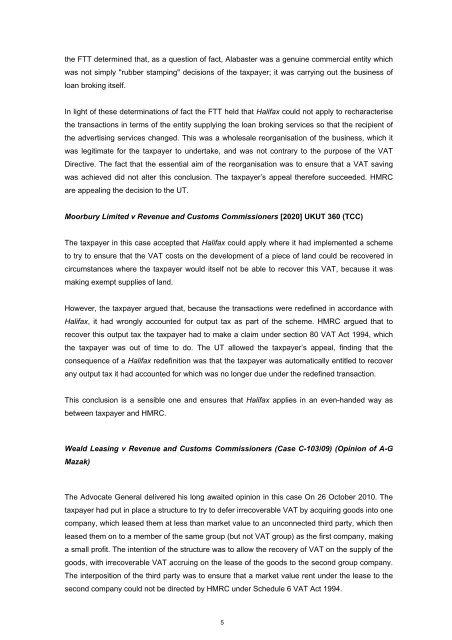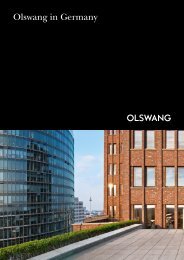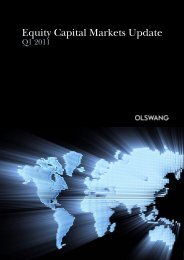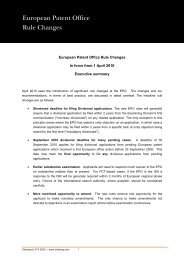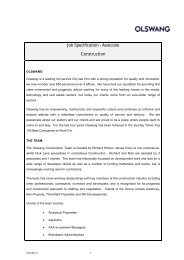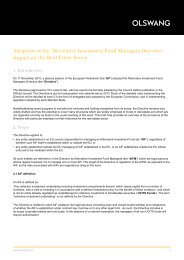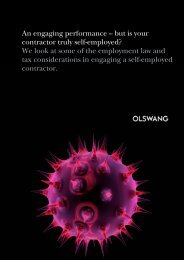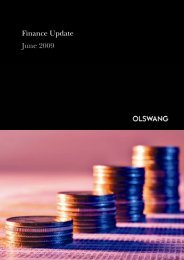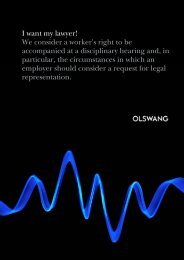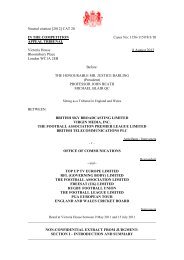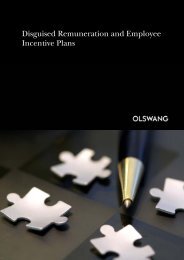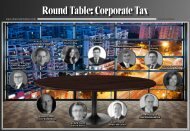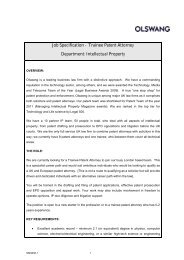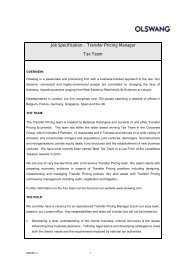Tax Advisor 2010 tax avoidance case law review - Olswang
Tax Advisor 2010 tax avoidance case law review - Olswang
Tax Advisor 2010 tax avoidance case law review - Olswang
Create successful ePaper yourself
Turn your PDF publications into a flip-book with our unique Google optimized e-Paper software.
the FTT determined that, as a question of fact, Alabaster was a genuine commercial entity which<br />
was not simply "rubber stamping" decisions of the <strong>tax</strong>payer; it was carrying out the business of<br />
loan broking itself.<br />
In light of these determinations of fact the FTT held that Halifax could not apply to recharacterise<br />
the transactions in terms of the entity supplying the loan broking services so that the recipient of<br />
the advertising services changed. This was a wholesale reorganisation of the business, which it<br />
was legitimate for the <strong>tax</strong>payer to undertake, and was not contrary to the purpose of the VAT<br />
Directive. The fact that the essential aim of the reorganisation was to ensure that a VAT saving<br />
was achieved did not alter this conclusion. The <strong>tax</strong>payer’s appeal therefore succeeded. HMRC<br />
are appealing the decision to the UT.<br />
Moorbury Limited v Revenue and Customs Commissioners [2020] UKUT 360 (TCC)<br />
The <strong>tax</strong>payer in this <strong>case</strong> accepted that Halifax could apply where it had implemented a scheme<br />
to try to ensure that the VAT costs on the development of a piece of land could be recovered in<br />
circumstances where the <strong>tax</strong>payer would itself not be able to recover this VAT, because it was<br />
making exempt supplies of land.<br />
However, the <strong>tax</strong>payer argued that, because the transactions were redefined in accordance with<br />
Halifax, it had wrongly accounted for output <strong>tax</strong> as part of the scheme. HMRC argued that to<br />
recover this output <strong>tax</strong> the <strong>tax</strong>payer had to make a claim under section 80 VAT Act 1994, which<br />
the <strong>tax</strong>payer was out of time to do. The UT allowed the <strong>tax</strong>payer’s appeal, finding that the<br />
consequence of a Halifax redefinition was that the <strong>tax</strong>payer was automatically entitled to recover<br />
any output <strong>tax</strong> it had accounted for which was no longer due under the redefined transaction.<br />
This conclusion is a sensible one and ensures that Halifax applies in an even-handed way as<br />
between <strong>tax</strong>payer and HMRC.<br />
Weald Leasing v Revenue and Customs Commissioners (Case C-103/09) (Opinion of A-G<br />
Mazak)<br />
The Advocate General delivered his long awaited opinion in this <strong>case</strong> On 26 October <strong>2010</strong>. The<br />
<strong>tax</strong>payer had put in place a structure to try to defer irrecoverable VAT by acquiring goods into one<br />
company, which leased them at less than market value to an unconnected third party, which then<br />
leased them on to a member of the same group (but not VAT group) as the first company, making<br />
a small profit. The intention of the structure was to allow the recovery of VAT on the supply of the<br />
goods, with irrecoverable VAT accruing on the lease of the goods to the second group company.<br />
The interposition of the third party was to ensure that a market value rent under the lease to the<br />
second company could not be directed by HMRC under Schedule 6 VAT Act 1994.<br />
5


